The Bard s Tale 4 Continue Story Same Story
Our Verdict
An old-fashioned game in a shiny new package, The Bard's Tale 4: Barrows Deep is a worthy addition to a classic series.
Need to know
What is it? A first-person, party-based dungeon crawler.
Expect to pay: $35/£28
Developer: inXile Entertainment
Publisher: inXile Entertainment
Reviewed on: Core i5-6600K, 16GB RAM, GeForce GTX-980 Ti, Windows 10
Multiplayer: None
Link: Official site (opens in new tab)
I've sunk about 40 hours into The Bard's Tale 4: Barrows Deep so far, and I'm not ready to hoist my 'Saved the World' tankard just yet. It's a really big game. But even though I have yet to dispatch the latest and greatest threat to the city of Skara Brae—and the greater world of Caith, because the adventure goes far beyond Skara Brae's walls—I am happy. This is the dungeon crawling adventure I've been waiting for.
The Bard's Tale 4 is a remarkable modernization of an infamously punishing old game, and the dungeon crawler genre as a whole. The update is most obviously apparent in the free-roaming movement system that lets me look and go where I want, without the conventional constraints of grid-based movement. It's all smoke and mirrors—the levels are as linear and corridor-based as they were in the original Bard's Tale games—but the free movement, map layouts, and longer lines of sight work together to brilliantly camouflage the angular restrictiveness and make it feel more like an open-world game.
It took me awhile to adjust to the oddities that this hybrid system sometimes enables. The tutorial level talks about sticking to the shadows to sneak past an enemy, for instance, but there's no actual stealth feature, and visibility is solely a matter of distance and positioning on the invisible grid that maps are built upon. It's often possible to stroll up to within speaking distance of an enemy without being seen.
Jumping, ducking, hiding, leaning, and other advanced movements that you'd expect from a first-person RPG aren't possible either, because—and I feel like this really deserve emphasis—that's not what The Bard's Tale 4 is. It might be dressed up like Skyrim Lite, but it's a Bard's Tale game through and through.
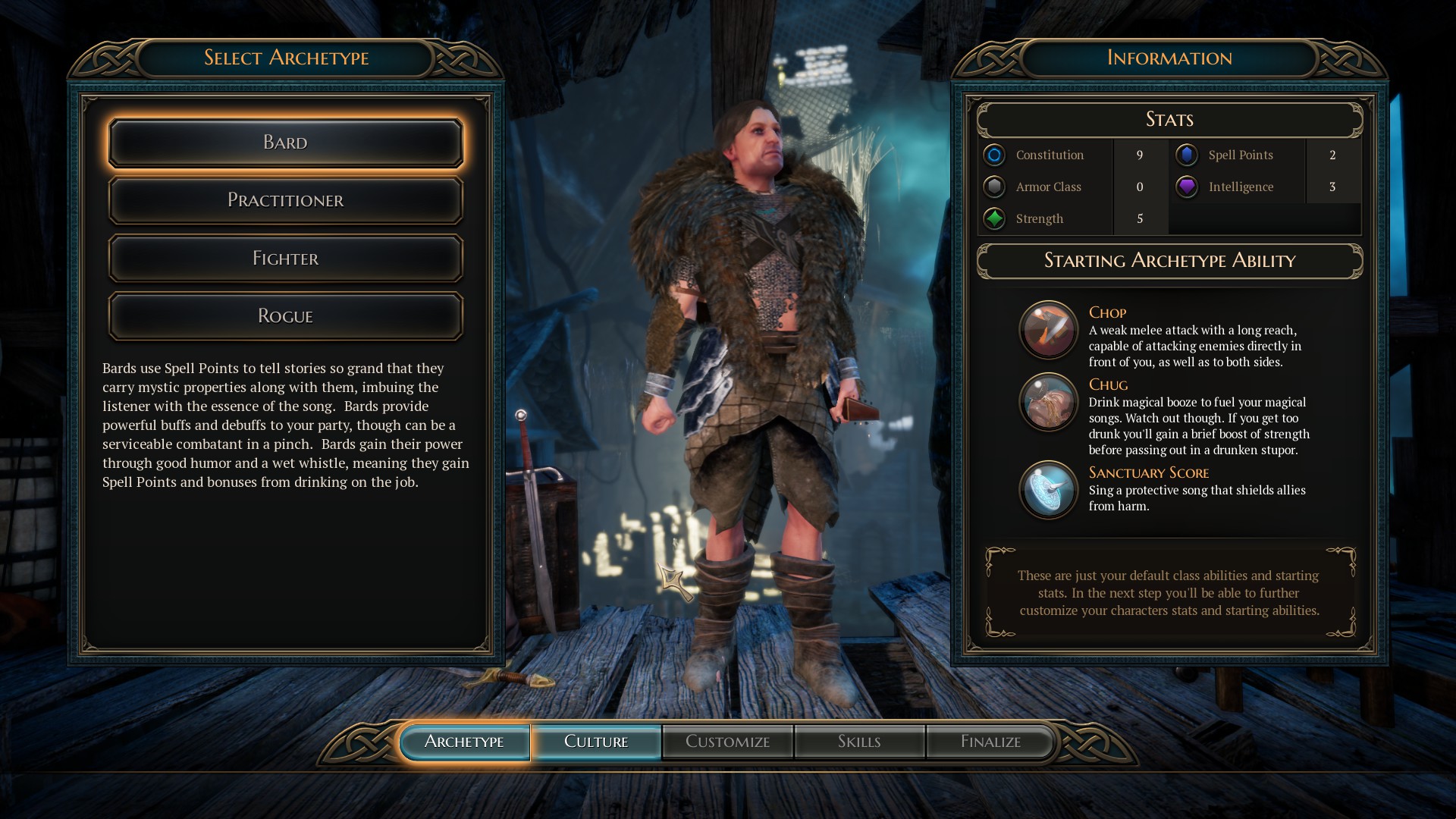
Shiny and old
The Bard's Tale will happily throw enemies in your path that you are woefully unprepared to handle.
As up-to-date as The Bard's Tale 4 looks and sounds (the ambient audio is fantastic), a number of the underlying systems are unforgivingly old-fashioned. Characters can't be re-specced, so if you make a bad choice or decide you don't like how your front-line tank is shaping up, that's too bad. Inventories aren't accessible in a fight, so forget about asking everyone to hold up while you open your pack and pull out a healing potion. Speaking of which, healing potions are in extremely short supply, and you can forget about crafting all you need because one of the herbs needed to make them is just as rare. And The Bard's Tale will happily throw enemies in your path that you are woefully unprepared to handle.
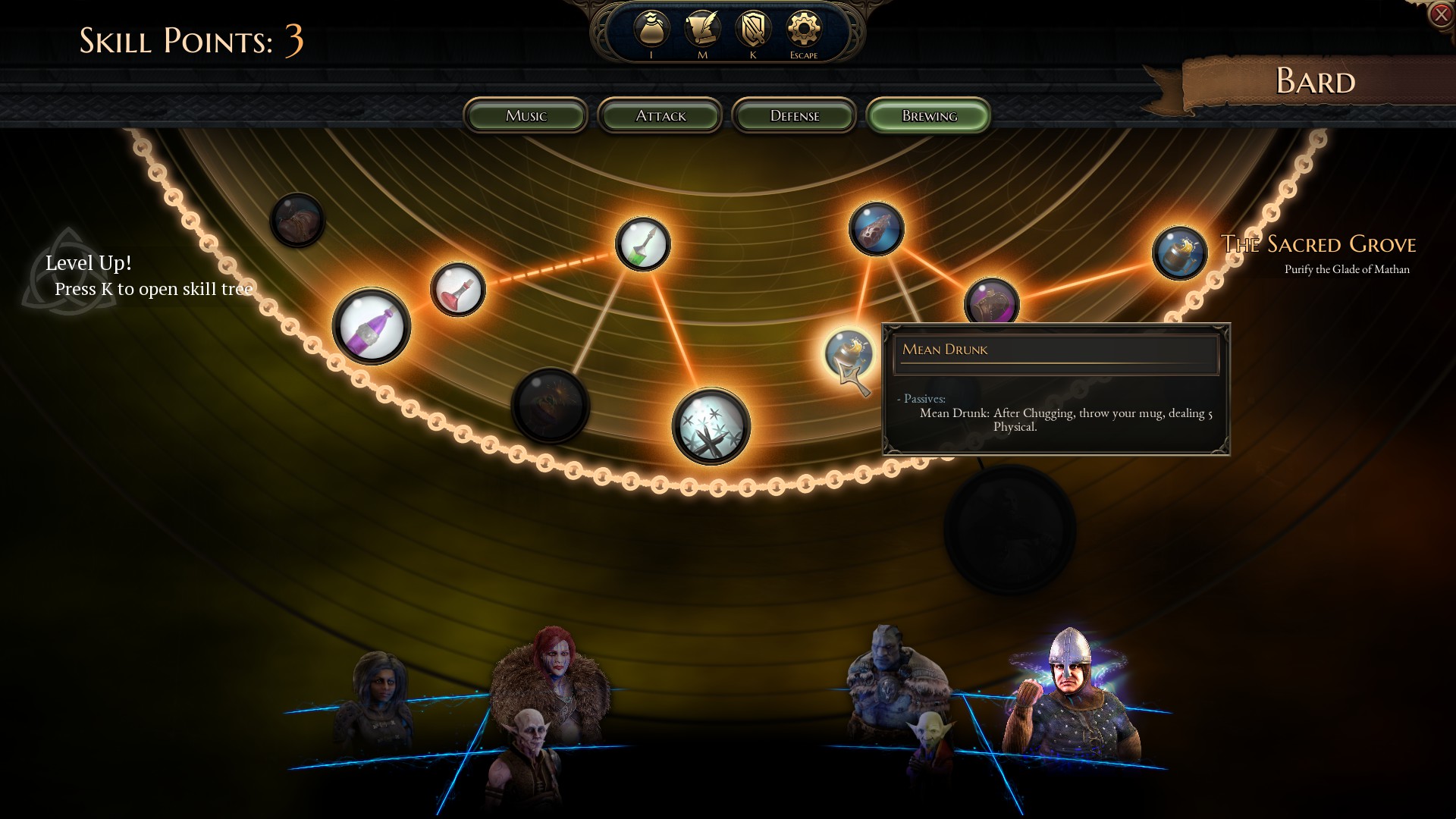
It was frustrating at times, until I came to terms with the idea that the fault was entirely mine for wasting resources and picking fights I couldn't win. The shortage of potions is a hassle, but it's something I can work around, rather than an unfair obstacle—kind of a puzzle in its own right. At one point on my adventures, I was faced with enemies who beat my ass severely. I could sometimes take them, but just barely, and not without blowing through far more potions than I wanted to. After several reloads (and increasing annoyance), inspiration struck: Go around them. It worked.
The leveling system is also from an entirely different era. Characters abilities are based on "masteries" that can be purchased as levels are earned: One level, one point, one mastery. But there are multiple tiers of masteries, and unlocking successive tiers requires the approval of the Adventurer's Guild Review Board, which will only grant it once you've unlocked enough of them at your current tier.
Because of that, chasing a specific ability or saving up points to sink into higher-level masteries isn't always viable because higher tiers won't unlock until you've enabled enough of them at your current rank. It's a hugely anachronistic but I actually like the way it saves me from the "build paralysis" I suffer when trying to figure out what to do with my characters. Instead of worrying about saving up skill points for the high-end abilities, I can blow them on the middling stuff without fear that I'm "wasting" them.
Other elements don't feel 'old' so much as just rough or unfinished. There's no inventory autosorting or stacking, paper doll screens aren't accessible when dealing with merchants so you can't see equipped weapons and armor when you're shopping for upgrades, and the map lacks detail—it doesn't indicate where the savegame markers are, for instance—and worse, it doesn't support manual notations. Little flags indicate "points of interest," but give no sign as to what's actually interesting about them. Maybe it's a nice view, or maybe there's a locked door or optional quest, but there's no way to leave a reminder on the map so that you'll know to pay attention the next time you're passing through the neighborhood.
Some of these issues have been addressed in a recently-released patch: Hard drive performance still isn't great but it's better than it was, there's an FOV slider, and crashing has apparently been reduced, although I didn't have any crash issues so I can't comment on that. InXile says future patches will continue to improve performance and gameplay, including the map, which will be cleaned up for "readability" and finally get save totem markers.
The save system bears a specific mention too. Bard's Tale 4 uses a manual checkpoint save system of "luck stones," some of which can be sacrificed—without a save—in exchange for a chunk of experience points. I really like (and hate) having to choose between the security of a save in the middle of a tough dungeon and the tantalizing promise of free and easy XP. But an unintended side effect is that I often take the XP, backtrack through a level to the most recent standard Luck Stone to save and rejuvenate my party, and then hike all the way back to the front line.
In a way, that's legitimately old-school too, kind of like the cheesy slide-and-swing maneuver commonly used in real-time grid-based dungeon crawlers: These games are hard, and we do what we must to win. But it's a good idea that doesn't quite come off in execution. At times I agonize over the choice between safety and XP, but more often than not I just end up doing a lot more walking. The potential for frustration is also high: There are plenty of save points, but if you forget to use them and then wipe, it's tough noogies for you. There are no autosaves or do-overs if you pooch a fight. I'm inclined to see that as a good thing, but not everyone shares that enlightened perspective.
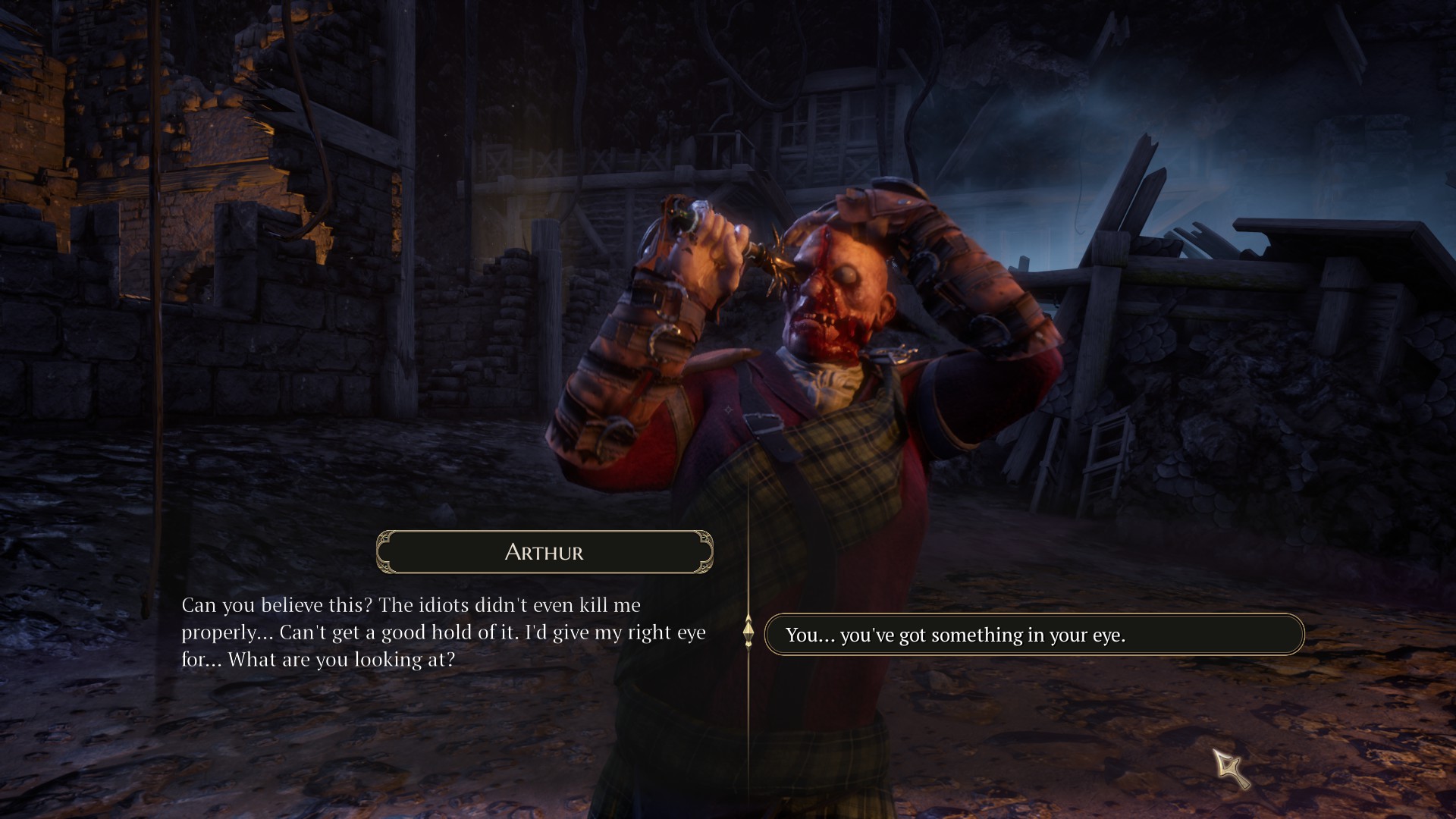
Skara Brae is back
Combat and exploration are where The Bard's Tale 4 really shines. Turn-based battles take place on a 4x4 grid with a shared pool of "opportunity points" determining what your party, and the enemy, can and can't do. Initiative is determined manually—charge an enemy and you get first strike, but it goes to them if you're spotted first—and proper positioning of your characters is vital, especially as the game wears on. 'Fighters up front, mages in the back' is timeless advice, but some class-specific maneuvers that inflict extra damage also have limited reach or proximity bonuses. Your magic user's flame attack does triple damage if you blast your opponent right in the face, as an example, so it might be worth moving her to the front rank to score that heavy punch. But it'll cost a point to move her up there, and another to pull her back to relative safety.
Tactical movement isn't the flashiest of Bard Tale 4's upgrades, but it is one of the most important because it can force some really tough decisions. As it's a turn-based game I can take as long as I like to ponder my options (although the enemy side will start to razz me if I dick around for too long) but ultimately there is no reward without risk: I might be able to save my badly injured fighter by pulling him back to the rear rank, but if he stays up front and eats one more hit, my magic user could have a better shot of getting off his devastating Warstrike spell. It can be nerve-wracking, because there's no guarantee that an enemy will react to your moves in the way you want him to, but a daring, high-risk maneuver that pulls out a last-second victory feels pretty great.
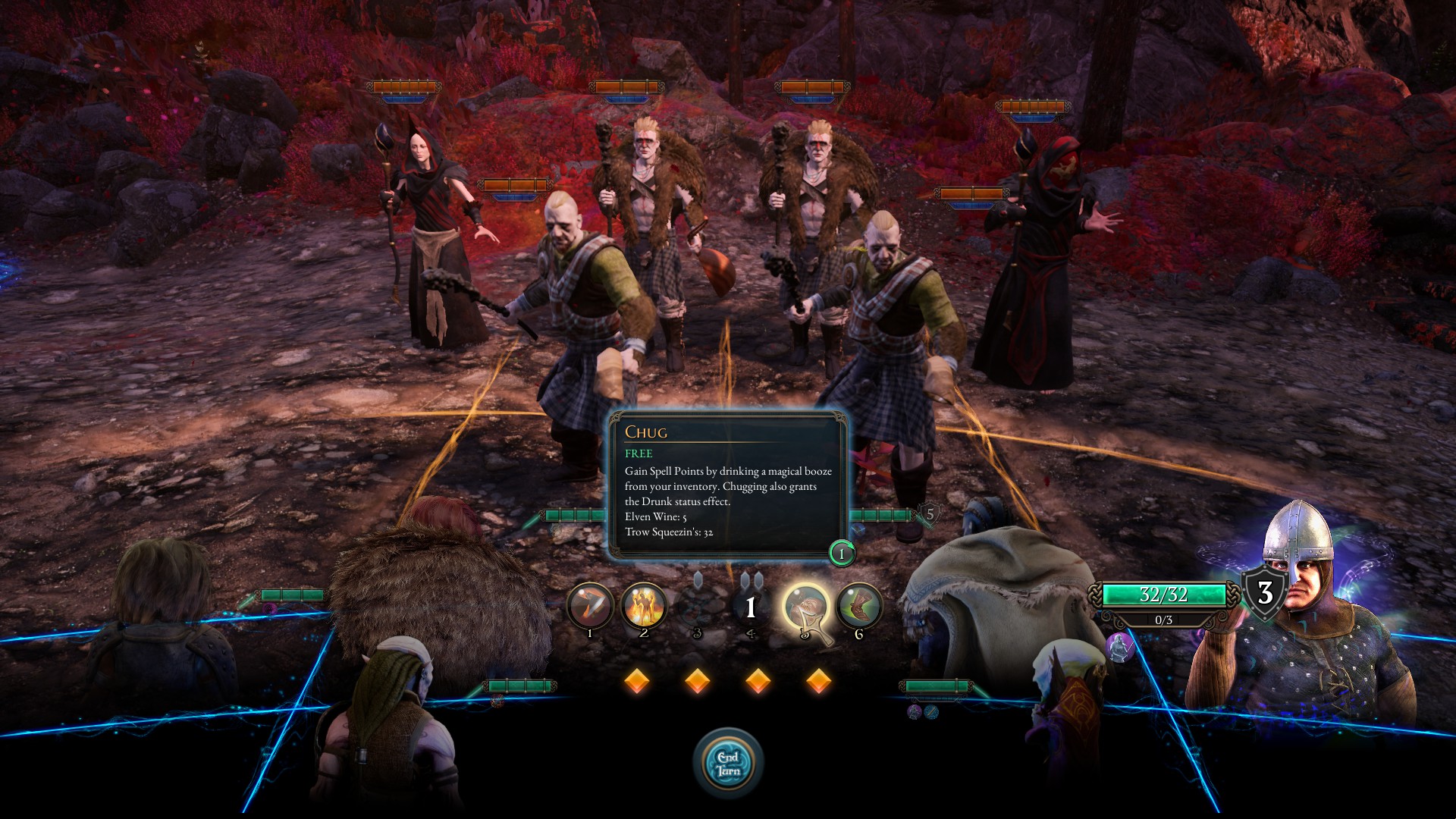
If I drink too much, I get one turn of angry super-strength—and then I fall over, helpless.
Effective use of buffs is also important. My personal avatar in The Bard's Tale 4 is, appropriately, a bard, and when people start fighting, I start drinking. The drunker I get, the more effective my songs, and the buffs they confer, become. But if I drink too much (which generally isn't a problem, but hey, everybody has bad days), I get one turn of angry super-strength—and then I fall over, helpless.
And because attack damage is a fixed value rather than RNG-based, wins or losses never feel cheap. I know exactly what's going to happen when my rogue lands a Shiv attack (assuming I'm paying attention), and so I can plan around it. I can't blame a shitty roll of the dice for losing a close fight, but I feel in control of what I'm doing because outcomes, good or bad, are dependent solely on my planning and execution. While there's some joy to rolling the dice in, say, XCOM, games like The Bard's Tale 4 and Into the Breach, which telegraph more outcomes, bring a chess-like intensity where every sacrifice and attack must be planed turns ahead.
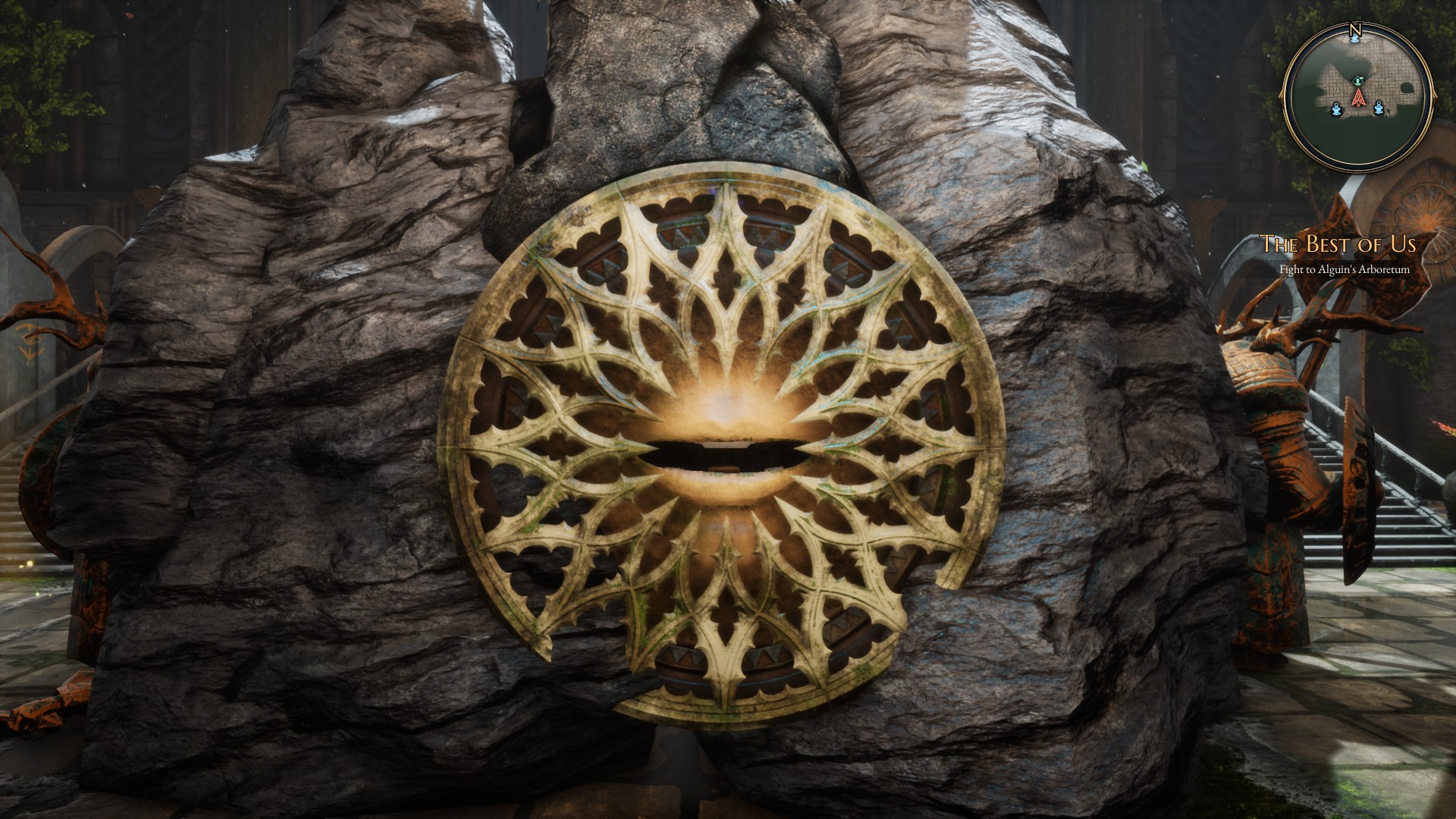
Drunkeneering
My bard's booziness is emblematic of a gentle silliness that runs through Bard's Tale 4. One of my masteries is Mean Drunk, which I chose solely for how ridiculous it is: After I chug a drink, I throw my magic mug at the enemy for 5 physical damage. There's a goofy lightheartedness to it that Serious Adventurers might not dig, but I really like it. It's endearing without being overbearing, and makes for a pleasant break from the usual grim business of dungeoneering. Enemy NPCs trash-talk amusingly during fights (they are particularly disdainful about my drunkenness) and party members banter as well, in a way reminiscent of the Baldur's Gate games. The Trow rogue tells dad jokes, the Dwarf fighter threatens to rip his ears off for it, and the Imp practioner—that's Bard's Tale terminology for magic user—gets a big bang out of tormenting me with threats of demonic possession.
The world of Caith is also an absolute delight. It's big, for one thing, and unexpectedly beautiful in parts, particularly the forest of Inshriach, a wooded area that opens up around the midpoint of the game. And there are all kinds of things to do. Combat is obviously at the top of the list, but there are people to talk to, puzzles to solve, lore to learn, and some pretty cool weapons and armor to pick up and play with. Some areas can be bypassed if you're in a hurry to get to the end (but why would you be?) and you can skip bits and come back to them later: I've got a giant who's been waiting for an ass-kicking in Skara Brae Below pretty much from the start of the game. The levels really feel packed, and it's worth putting time into properly exploring them. And there is one important concession to modern gameplay in the form of adjustable difficulty. 'Easy' mode isn't a walk in the park, but it does makes combat noticeably more manageable.
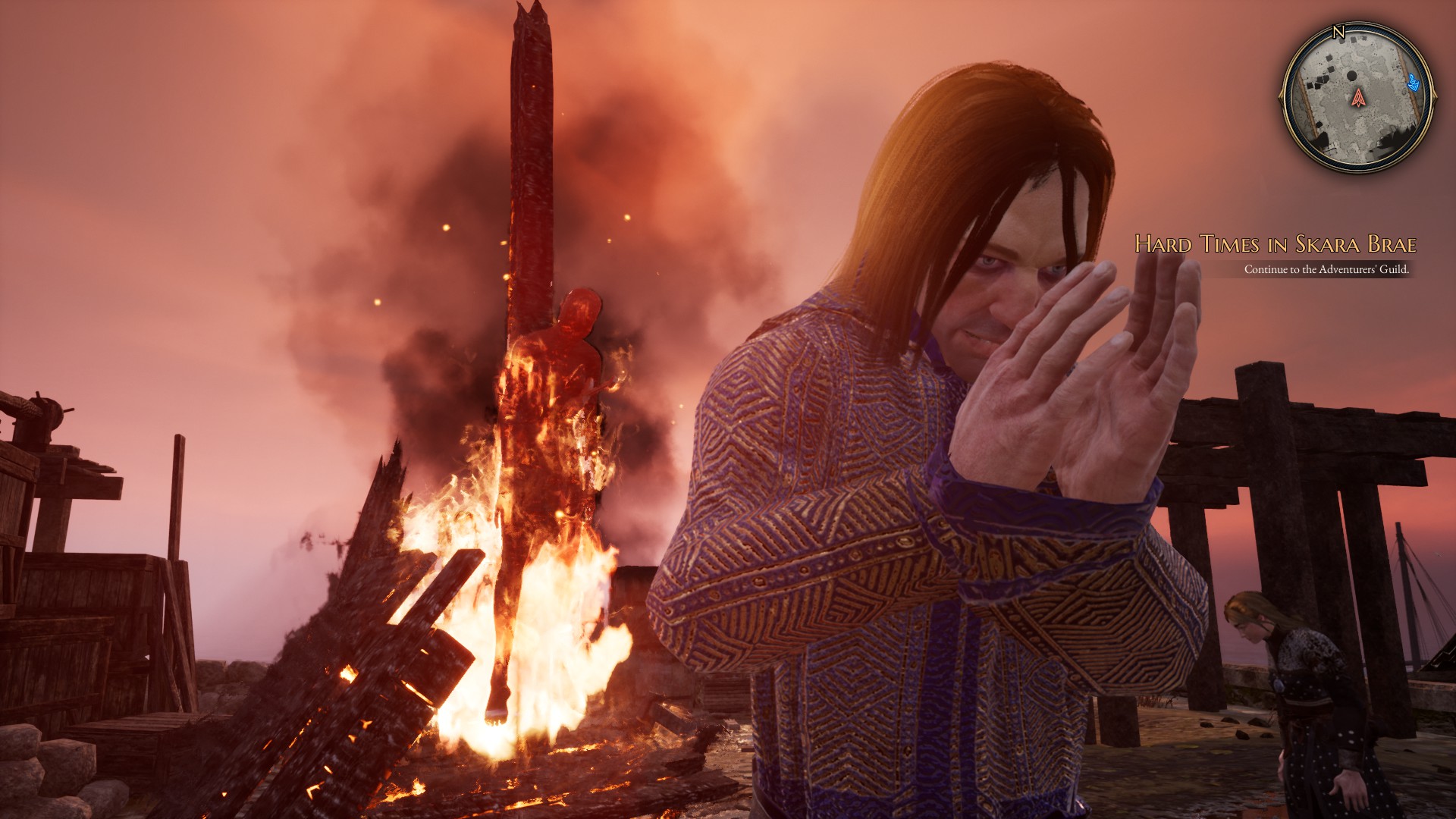
For old-time adventuring in a sprawling, vibrant world, The Bard's Tale 4: Barrows Deep delivers.
The story underlying all this dungeon crawling business is fairly rote fantasy stuff about a powerful bad guy and a nefarious plot to take over the world (or maybe blow up, I'm not entirely clear on that). Familiarity with the old Bard's Tale games is fun for picking up references—the first major villain I encountered was Mangar, the final boss of the original Bard's Tale, and there's a shrine to creator Michael Cranford next to the old Adventurer's Guild, which I think is a nice touch—but not at all necessary to enjoy the story or understand what's happening. Not that Bard's Tale 4 leans too heavily on narrative anyway: The entire basis for the game is that my pal and I happened to be in the wrong place at the wrong time, and I wasn't doing anything else so I decided to help him out.
Again, that's the old school approach: We're here because we're heroes, and this is what heroes do. If you need more motivation than that—a deeper meaning, or maybe a more elegantly-told tale—then this may not be your kind of thing. But for old-time adventuring in a sprawling, vibrant world, The Bard's Tale 4: Barrows Deep delivers.
The Bard's Tale IV
An old-fashioned game in a shiny new package, The Bard's Tale 4: Barrows Deep is a worthy addition to a classic series.
Source: https://www.pcgamer.com/the-bards-tale-4-barrows-deep-review/
0 Response to "The Bard s Tale 4 Continue Story Same Story"
Post a Comment